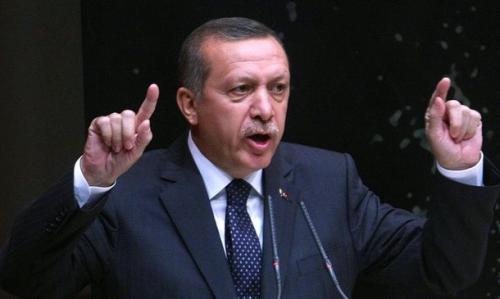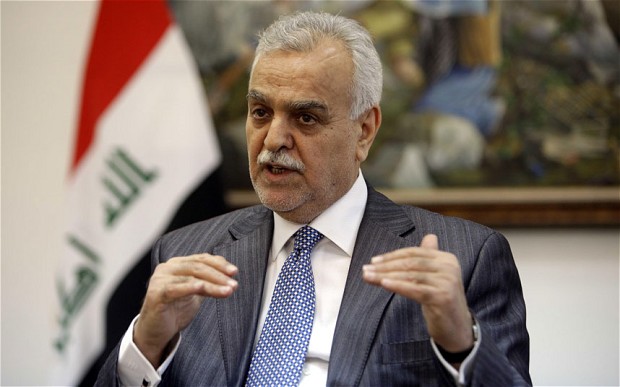Turkey to Freeze Relations with EU If Greek Cypriots Assume EU Presidency before Parties Reach Solution
Turkish Foreign Minister Ahmet Davutoğlu received European Commissioner for Enlargement Stefan Füle at the Foreign Ministry in Ankara on Wednesday. Turkish Foreign Minister Ahmet Davutoğlu said on Wednesday that Turkey would freeze relations with the European Union if the Greek Cypriots continue to delay negotiations and assume the EU presidency before the parties reach a solution on the divided island of Cyprus.
Davutoğlu underscored that Turkey cannot accept the union as an interlocutor under the presidency of Cyprus in such a situation. “I openly told this to [European Commissioner for Enlargement] Stefan Füle as well. We do not think that relations between the EU and Turkey can be maintained under the term presidency of southern Cyprus without a solution [to the Cyprus issue],” Davutoğlu said during a joint press conference he held with Ukrainian FM Konstantin Grischenko in Ankara.
Ankara’s goal is reaching a swift solution on Cyprus and Greek and Turkish Cypriots jointly assuming the upcoming EU term presidency in July 2012, the minister said. “If this does not happen, and if the Greek Cypriot side takes over the term presidency unilaterally on July 12 via delaying negotiations, this does not mean only non-settlement; it also means a freezing point beyond the stagnation in relations between Turkey and the EU,” Davutoğlu said. An immediate response came from Füle, who said he believes “it is not a good time to make such comments” on the Cyprus issue.
The six-month-long rotating presidency of the 27-member bloc will be held by Denmark in the first half of 2012 and by Greek Cyprus in the second half of the year. The upcoming Greek Cypriot rotating presidency makes resolution of the Cyprus issue more and more urgent and vital for Ankara since it doesn’t recognize the southern Cyprus Greek administration on the divided island as the representative of the entire island.
Greek and Turkish Cypriots are engaged in the latest round of long-running, UN-backed talks for a reunification that has defied a solution for decades. Former Turkish Cypriot President Mehmet Ali Talat and Greek Cypriot leader Dimitris Christofias first initiated negotiations in Sept. 2008 to find a peaceful settlement to the decades-long conflict.
Yet, no significant progress has been achieved thus far. Turkey and the Turkish Cypriots want a quick end to talks, while the Greek Cypriots reject any timetable. Cyprus was divided through a Turkish intervention in 1974 triggered by a brief Greek-inspired coup. Greek Cypriots represent the island internationally and in the EU, while Turkey is the only country to recognize the Turkish Republic of Northern Cyprus (KKTC), which unilaterally declared its independence in 1983.
The Cyprus dispute is a major obstacle for Turkey’s bid to join the EU, aside from opposition from EU heavyweights France and Germany. Greek Cypriots say Turkey cannot join the bloc until the Cyprus conflict is resolved. The EU also expects Turkey to implement the Ankara Protocol, whereby Turkish ports and airports will be opened to traffic from Greek Cyprus. Turkey says the EU should also end its blockade of Turkish Cyprus.
Turkish and Greek Cypriot leaders have been holding talks for reunification of the island since September 2008, but no significant progress has been achieved so far. Turkey and the Turkish Cypriots want a quick end to talks, while the Greek Cypriots reject any timetable.
Davutoğlu recently said Turkey hopes terms for the reunification of Cyprus can be agreed by the end of the year so that a referendum can take place in early 2012. “We hope to find a solution to the Cyprus problem by the end of the year, and hold a referendum in the early months of next year so that Cyprus can take on the presidency of the EU as a new state that represents the whole island,” Davutoğlu said in the divided Cypriot capital of Lefkoşa over the weekend.
UN Secretary-General Ban Ki-moon also said last week that he expected the two sides to overcome their differences by October. Peace talks have stumbled on since being re-launched in 2008. In coming months, the UN team acting as a facilitator could take a more active role in peace talks. In principle, both sides agree to reunite Cyprus as a two-zone federation, but they have been unable to reconcile differences ranging from re-drawing existing boundaries, to property claims by thousands uprooted in conflict.
13 July 2011
SOURCE: TODAY’S ZAMAN




